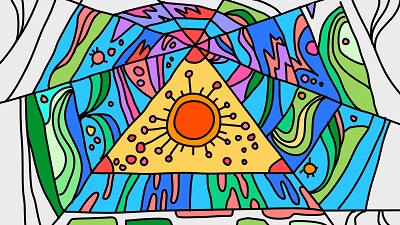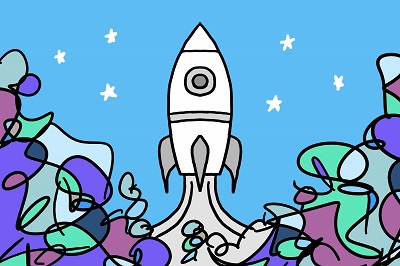An Invitation to Make the Shift
Lisa Lindeman, Ph.D.
After engaging in relatively traditional research and evaluation for the past decade, learning about SenseMaker®, a tool and methodology developed by Cognitive Edge, and its complement, the Cynefin framework, involved a significant paradigm shift. With a background in experimental psychology, I was accustomed to thinking about research in fairly linear terms where outcomes are determined by combinations of causes at least hypothetically discernible through detailed measurement. Ideally, an experiment establishes that a given cause is reliably tied to a given effect, and the effect is generally reproducible by duplicating the cause.
In contrast, SenseMaker is based on complex systems thinking which emphasizes that the same cause can produce different outcomes depending on the overall state of the system, and the system is more than the sum of its parts. Small factors can quickly lead to massive events, and although you may find propensities for certain outcomes, the future is unpredictable. If linear thinking is Newtonian physics, complex systems thinking is general relativity—it’s a bit counter-intuitive and sometimes the old model suffices, but it nevertheless offers a deeper understanding of reality.
Adjusting to a New Paradigm
Paradigm shifts involve more than a change in thinking. They’re an emotional, gut-level experience. Ironically, the dynamics of this shift can be described using the Cynefin framework. The key is that thought and emotion are not as separate as we make them out to be, and changing one’s mind about anything big feels like disassembling a city in order to reassemble it on Mars. Cities aren’t supposed to move, right? For this reason, paradigm shifts are difficult and rare, but once you glimpse a new worldview, you can’t unsee it.

Palm Health Foundation invited me to write a report sharing their initial work with SenseMaker. My first inclination was to approach the data with an eye for analysis. SenseMaker makes it possible to gather hundreds of personal stories, or “micro-narratives,” but this corpus of qualitative data is tied to people’s responses to follow-up questions. People are able to interpret their own narratives using continuous scales between two or three response options (with three arranged in a triangle allowing the response to float anywhere between the three options). The result is extensive, nuanced quantitative data—a researcher’s candy land.
I wondered how, for example, the level of control people felt their community experienced in their story predicted the emotional tone people assigned to their story. Do stories about empowered communities also feel better to the storyteller? Well probably, but in fact, not always. If I stuck with a traditional analysis, the insights yielded by those few oddball cases, where a powerless community was somehow part of a positive story, would be lost.
Traditional statistical analysis is of limited use with SenseMaker data. In complex systems, the relationship between a cause or intervention and an outcome can change over time. Resolving the cause-and-effect relationships in a complex system is like trying to put a jigsaw puzzle together while the images on each piece continuously change. Even with random sampling from the community, generalizing findings to the population (the raison d’etre of frequentist statistics in the behavioral sciences) conflicts with the SenseMaker methodology. Apart from statistical concerns (such as the data deviating from the normal distribution), statistics are not necessarily what a community needs to move forward.
The Data is in the People
A SenseMaker study starts and ends with the community. People share their stories, interpret their own stories, and collectively make sense of their stories in order to innovate. In many ways, the data is not in a spreadsheet. It’s in the people. SenseMaker helps communities engage collectively with the wisdom and experience they already have individually. This approach works with the unpredictability of social systems rather than against it.
Given the primacy of the community in interpreting their own data, in coming to their own conclusions, it took me some time to realize that I could not end the report with a traditional set of findings. This was for me a paradigmatic threshold, a point-of-no-return. Instead of trying to squeeze the SenseMaker study into the format of a traditional research report, I would need a new format.
The report contains sections intended to help readers make the same paradigm shift I needed to make in order to fully appreciate the SenseMaker approach and understand where the decision-making framework fit in. While this shift primarily took place in my professional thinking, in my work as a researcher, it overlapped with my personal experiences of the world.
Leaving My Comfort Zone
The gut-level barrier generated by complex systems thinking is the desire for simplicity or control. Even if you accept complexity and chaos theory intellectually, which I had, it’s another matter to accept that your own future is not going to follow a logical, linear path and adopt complexity as a guide for navigating your fate.
In the Cynefin framework, the complex domain is placed in context with three other domains: clear, complicated, and chaotic. Our natural tendency as human beings is to find some way of simplifying our experience and charting our path forward in step-by-step fashion. The clear domain is where we usually long to be. Clarity is comforting.

If circumstances depart from our expectations, it’s easy to think we simply need more information, or we need to spend more time organizing that information. While complicated matters are unpleasant, complication presents a challenge that is at least theoretically surmountable with more information. Thus, mastering the complicated can induce even greater emotional reward than resting in simplicity.
I live about twenty miles from Cape Canaveral. Once or twice a month, launches rattle our windows. We can see SpaceX rockets breach the stratosphere from our backyard. I haven’t tired of watching them yet. On a cloudy night, flames from the exhaust light up the sky like an otherworldly sunset before disappearing beyond the clouds. As a Star Trek fan, I get a thrill witnessing the power of human inventiveness free humans from the Earth itself. Embodied in each launch is an expansion of vision, capability, and control. We can literally see further; we can know more; we can control our fate.
This is the joy one obtains with mastery in the complicated domain. That moment of insight when information becomes knowledge and ideas come together is my version of a SpaceX launch. When I feel like I “get it,” the chaos has settled into certainty and clarity. Clarity stands in stark contrast with the horror of the chaos domain where unpredictable circumstances destroy our castles in the sand, and no amount of knowledge is enough to rebuild them.
At Ease with Uncertainty
The most unpredictable element in most systems is human—the continuous stream of choices by people in boundless networks influencing one another’s future. I’ve been coding since I was 11 when the Atari 800XL was a popular computer for ordinary consumers, and Microsoft Basic was one of the latest programming languages. If I write and run lines of code, they always do the same thing. Errors are repairable; it’s just a matter of finding the segment of code in need of correction. When life feels uncertain, coding is my ambrosia. I either know what’s coming, or I can retrace my steps and fix the outcome.
In contrast, countless people throughout my life have made choices that sent my future into a tailspin, and people do not come with a manual. I studied human nature for 20 years and earned my doctorate in psychology in 2010. If perfectly predicting the behavior of social systems were equivalent to the moon landing, the field of psychology is still arguing that the sun does indeed revolve around the earth. In just the past century, psychologists completely ignored people’s inner lives as they sought to boil human nature down to code. In their research endeavors, thought and emotion were off the table. Inputs and outputs is all they allowed themselves to see. Ones and zeroes. This might seem absurd, but the legacy of black box behaviorism is still with us. Like any paradigm, it’s hard to shake off.

We are not programs, and the social sciences are light years from predicting or controlling human behavior, especially the behavior of social systems, with great certainty. Visions of such a future are almost always dystopic. Resistance is not futile. Chaos may be horrifying at times, but complete control over all humans is a science fiction nightmare.
There is a middle way. The Cynefin framework calls attention to complexity, which sits roughly between the complicated and the chaotic. Like the Romulan neutral zone, it puts space between these warring domains, and in the process, negotiates a treaty between the part of us that craves predictability and the part that needs occasional pandemonium for positive transformation.
In many ways, Cognitive Edge is selling uncertainty, a tough product to peddle, but in fact the pull to complexity is an invitation to engage with this human existence in the most rewarding way. It’s mighty hard to settle into a space where you won’t always feel like you’re “getting it.” If we are to nudge our futures in a desired direction, certainty is not always necessary. Relaxing the need for certainty can even, paradoxically, align us more closely with reality.
In a complex system, there is no single, fixed strategy for forcing the future to take the shape we want. Instead, we must respond to changes as they come. From a research perspective, in complexity, the experiment is never over.
